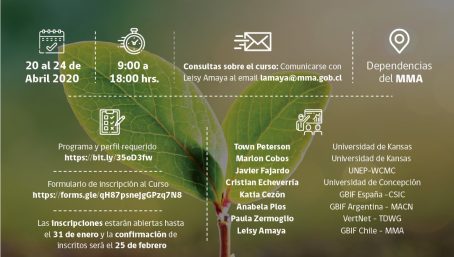Data Use for Decision Making Workshop: an Iberoamerican community call
This project was funded by the GBIF Capacity Enhancement Support Programme (CESP) in its 2019 call. It is aimed to bridge the gap between the scientific community and key environmental decision-makers in the Latin American region and Spain, such as ministries and local environmental authorities, national systems of protected areas and other environmental professionals. This would allow evidence-based biodiversity conservation decisions that can effectively influence the national and local governments policy, improving the overall biodiversity conservation actions and their impact in the region.
The main activities of this project will be:
- Online discussions to design the regional workshop contents.
- Review, adaptation, and translation of the existing materials from workshops organized by the BID Programme of GBIF.
- Call and selection of workshop candidates.
- Pre-workshop online activities.
- Regional workshop on Data Use for Decision Making and its evaluation.
Project partners:
- GBIF Chile (coordinating organization).
- SiB Colombia.
- GBIF Argentina.
- GBIF Spain.
- VertNet.
- GBIF Ecuador.
- Ministry of the Environment of Ecuador.
- Ministry of the Environment of Peru.
Regional workshop on Biodiversity Data Use for Decision Making
Workshop objective: capacity building on how to use biodiversity data during national decision-making processes for experts working on biodiversity conservation from public administrations. This workshop will bridge the gap between the scientific community and key environmental decision-makers in the participant countries (Chile, Colombia, Argentina, Spain, Ecuador and Peru).
Participants will learn how important biodiversity data are within the decision-making process, prepare information to be used and run basic analysis aimed to determine the species distribution and evaluate their conservation status. Once the workshop finishes, participants will have the capacity to disseminate the knowledge acquired during the workshop to the stakeholders involved in the decision-making process.
Date: April 20-24, 2020 [POSTPONED*]
* Due to the exceptional situation generated by the COVID-19, the online preparatory workshop will be postponed to September and the Chile onsite workshop will be predictably on November 30 to December 4, 2020. The confirmation of these dates will depend on the local health situation in Chile and the rest of the participant countries. The project team will monthly evaluate the situation and will inform about any change related to the workshop.
Venue: Comuna de Universidad Autónoma de Chile (Avda. de Pedro de Valdivia – Comuna de Providencia, Santiago de Chile)
Language: Spanish
Fee: participation costs for this workshop (transport, accommodation and meals) are fully covered by the project, funded by GBIF and co-funded by the involved GBIF nodes.
Student profile and inscriptions: this workshop is addressed to those experts with strategic impact on environmental policies (representatives of national networks, public services, museums, research centres, and NGOs), with a broad understanding on biodiversity data management and basic knowledge on biodiversity informatics, useful to include data use technics in decision-making processes. Candidates should fulfil the following requirements:
- Experience in biodiversity informatics, ecology and/or conservation.
- Basic knowledge of informatics tools for statistical and geographical analysis (eg.: GIS, R software,…).
- Being familiar with national and international regulations for biodiversity fields, such as the Convention of Biological Diversity, Aichi Biodiversity Targets, Sustainable Development Goals, CITES, IUCN, etc.
- Being able to disseminate the knowledge acquired during the workshop in their work.
Inscriptions should be made filing this form by January 31, 2020.
Workshop modules:
- Biodiversity data integration
- Obtaining the framework for the integration of biodiversity data within the decision-making process and understand the importance of data under this framework.
- Identifying how to publish biodiversity data and the main sectors of Public Administration with the capacity to publish data through GBIF in the future.
- Learning how to develop a communication strategy to influence the involved sectors in the use of biodiversity data during the decision-making process.
- Data management
- Learning how to get the highest level of data quality for later appropriate uses.
- Standards and protocols for the elaboration of maps
- Knowing the standards in the elaboration of IUCN maps to be able to create species distribution maps.
- Ecological niche modelling
- Learning how to run and interpret a basic ecological model to determine the species distribution.
- Evaluation of species conservation status
- Learning how to apply some criteria and categories from the IUCN Red Lists by using spatial data.
- Tools to identify conservation priorities
- Knowing some tools and applications useful to identify important areas for conservation based on scientific criteria and biodiversity data.
Teachers:
- Town Peterson (Biodiversity Institute. Kansas University)
- Marlon Cobos (Biodiversity Institute. Kansas University)
- Cristian Echeverría (Faculty of Forest Science. University of Concepción – Chile)
- Paula Zermoglio (VertNet Project. University of Buenos Aires)
- Katia Cezón (Data Manager of GBIF Spain. CSIC)
- Anabela Plos (Node Manager of GBIF Argentina. GBIF Regional Representative for Latinamerica and Caribe. SNDB-MinCyT. Argentinian Museum of Natural Science – CONICET)
- Javier Fajardo (Modelling expert. World Conservation Monitoring Centre (UNEP-WCMC) – Cambridge, United Kingdom)
- Leisy Amaya (Node Manager of GBIF Chile. GBIF Regional Associated Representative for Latinamerica and Caribe. Ministry of Environment)
Agenda:
The complete agenda for this workshop is available in this link (just in Spanish).
